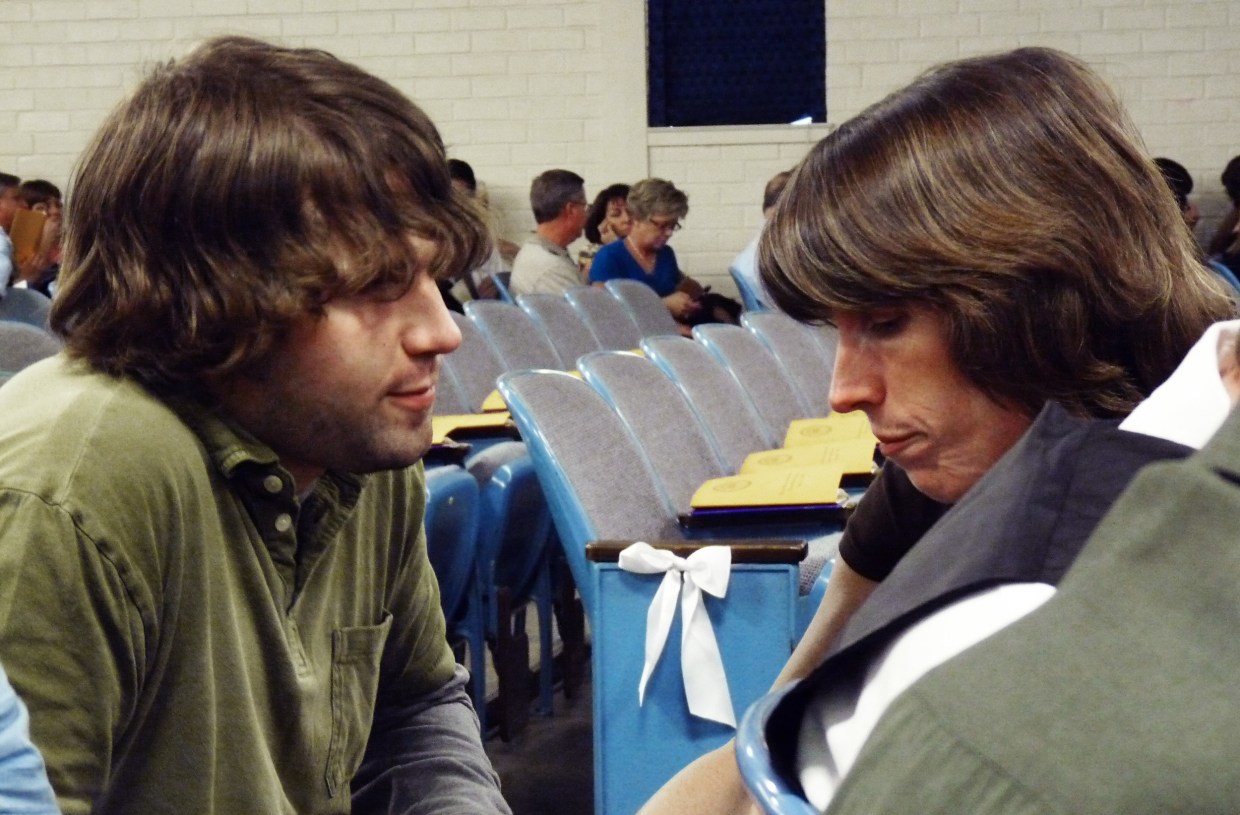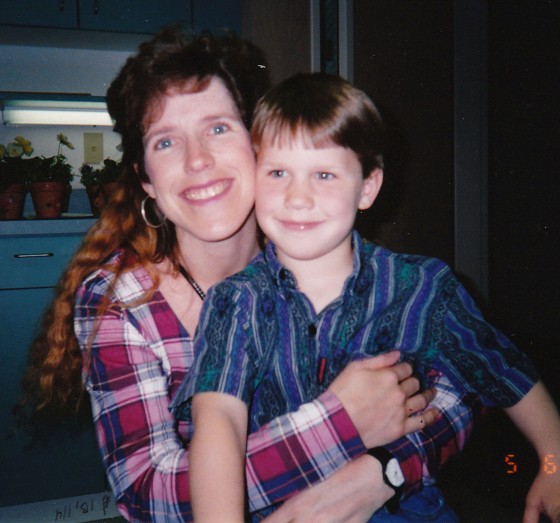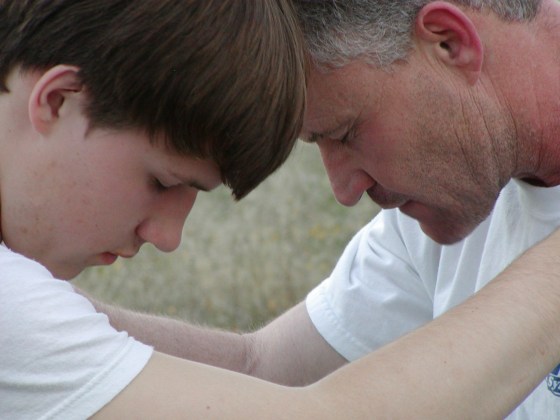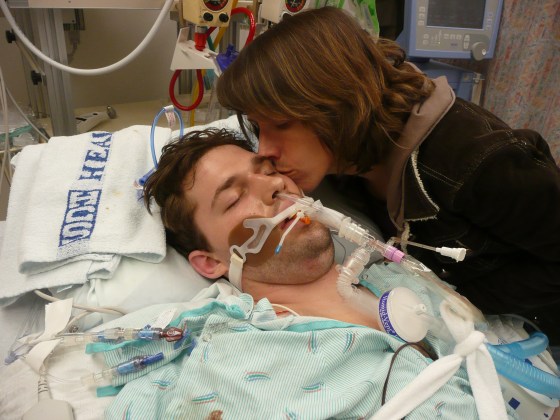"Son Let's Pray" How I Tried to Stop My Son From Being Gay
 |
Linda Robertson originally wrote this essay in 2012, three years after her son’s death, and published it on her blog in 2013. Since then, her family’s story has spread — it was featured in the documentary, “For They Know Not What They Do” — and Robertson has become an advocate for LGBTQ inclusion in faith-based spaces. She hopes to unite parents on both sides of the issue, knowing that all parents just want what is best for their children.
Robertson is sharing her story again with TODAY given the current issues LGBTQ youth are facing, and in the hopes that her story will reach other parents who may find themselves in a similar situation.
On the night of Nov. 20, 2001, a conversation held over AOL Instant Messenger changed our lives forever. Our 12-year-old son messaged me in my office from the computer in his bedroom.
Ryan: can i tell u something
Mom: Yes I am listening
Ryan: well i don’t know how to say this really but, well……, i can’t keep lying to you about myself. I have been hiding this for too long and i sorta have to tell u now. By now u probably have an idea of what i am about to say.
Ryan: I am gay
Ryan: i can’t believe i just told you
Mom: Are you joking?
Ryan: no
Ryan: i thought you would understand because of uncle don
Mom: of course I would
Mom: but what makes you think you are?
Ryan: i know i am
Ryan: i don’t like hannah
Ryan: it’s just a cover-up
Mom: but that doesn’t make you gay…
Ryan: i know
Ryan: but u don’t understand
Ryan: i am gay
Mom: tell me more
Ryan: it’s just the way i am and it’s something i know
Ryan: u r not a lesbian and u know that. it is the same thing
Mom: what do you mean?
Ryan: i am just gay
Ryan: i am that
Mom: I love you no matter what
Ryan: i am white not black
Ryan: i know
Ryan: i am a boy not a girl
Ryan: i am attracted to boys not girls
Ryan: u know that about yourself and i know this
Mom: what about what God thinks about acting on these desires?
Ryan: i know
Mom: thank you for telling me
Ryan: and i am very confused about that right now
Mom: I love you more for being honest
Ryan: i know
Ryan: thanx
 |
The author with her son as a boy.Courtesy Linda Robertson |
We were completely shocked. Not that we didn’t know and love gay people — my only brother had come out to us several years before, and we adored him. But Ryan? He was unafraid of anything, tough as nails, and all boy. We had not seen this coming. The emotion that overwhelmed us, kept us awake at night and, sadly, influenced all of our reactions over the next six years, was fear.
We said all the things that we thought loving Christian parents who believed the Bible — the Word of God — should say:
We love you. We will always love you. And this is hard. Really hard. But we know what God says about this, and so you are going to have to make some really difficult choices.
We love you. We couldn’t love you more. But there are other men who have faced this same struggle, and God has worked in them to change their desires. We’ll get you their books; you can listen to their testimonies. And we will trust God with this.
We love you. We are so glad you are our son. But you are young, and your sexual orientation is still developing. The feelings you’ve had for other guys don’t make you gay. So please don’t tell anyone that you ARE gay. You don’t know who you are yet. Your identity is not that you are gay — it is that you are a child of God.
We love you. Nothing will change that. But if you are going to follow Jesus, holiness is your only option. You are going to have to choose to follow Jesus, no matter what. And since you know what the Bible says, and since you want to follow God, embracing your sexuality is NOT an option.
We thought we understood the magnitude of the sacrifice that we — and God — were asking for. And this sacrifice, we knew, would lead to the abundant life, perfect peace and eternal rewards, even if it was incredibly diffic
Ryan had always felt intensely drawn to spiritual things. He desired to please God above all else. So, for the first six years, he tried to choose Jesus. Like so many others before him, he pleaded with God to help him be attracted to girls. He memorized scripture, met with his youth pastor weekly and went to all the youth group events and Bible studies. He chose to get baptized and filled journals with his prayers. He read all the Christian books that explained where his gay feelings came from and dove into counseling to further discover the origin of his unwanted attraction to other guys. He worked through difficult conflict resolution with my husband, Rob, and me, and invested even more deeply in his friendships with other (straight) guys, just like the reparative therapy experts advised.
 |
Ryan, pictured here with his father, "pleaded with God to help him be attracted to girls," his mother recalls. Courtesy Linda Robertson
But nothing changed. God didn’t answer Ryan’s prayers — or ours. We all believed that the God of the Universe — the God for whom nothing is impossible — could easily make Ryan straight. But He did not.
Though our hearts may have been good (we truly thought what we were doing was loving), we did not even give Ryan a chance to wrestle with God, to figure out what he believed God was telling him through scripture about his sexuality. We had believed firmly in giving each of our four children the space to question Christianity, to decide for themselves if they wanted to follow Jesus, to truly own their own faith. But we were too afraid to give Ryan that room when it came to his sexuality, for fear that he’d make the wrong choice.
We told our son that he had to choose between Jesus and his sexuality. We forced him to make a choice between God and being a sexual person.
Basically, we told our son that he had to choose between Jesus and his sexuality. We forced him to make a choice between God and being a sexual person. Choosing God, practically, meant living a lifetime condemned to being alone. As a teenager, he had to accept that he would never have the chance to fall in love, hold hands, have his first kiss or share the intimacy and companionship that we, as his parents, enjoy. We had always told our kids that marriage was God’s greatest earthly gift, but Ryan had to accept that he alone would not be offered that present.
And so, just before his 18th birthday, Ryan, depressed, suicidal, disillusioned and convinced that he would never be able to be loved by God, made a new choice. He decided to throw out his Bible and his faith at the same time, and to try searching for what he desperately wanted — peace — another way. And the way he chose to try first was drugs.
We had unintentionally taught Ryan to hate his sexuality. And since sexuality cannot be separated from the self, we had taught Ryan to hate himself. So as he began to use drugs, he did so with recklessness and a lack of caution for his own safety that was alarming to everyone who knew him.
Suddenly our fear of Ryan someday having a boyfriend (a possibility that honestly terrified me) seemed trivial in contrast to our fear of Ryan’s death, especially in light of his recent rejection of Christianity, and his mounting anger at God.
Ryan started with weed and beer, but in six short months was using cocaine, crack and heroin. He was hooked from the beginning, and his self-loathing and rage at God only fueled his addiction. Shortly after, we lost contact with him. For the next year and a half we didn’t know where he was, or even if he was dead or alive. And during that horrific time, God had our full attention. We stopped praying for Ryan to become straight. We started praying for him to know that God loved him. We stopped praying for him never to have a boyfriend. We started praying that someday we might actually get to know his boyfriend. We even stopped praying for him to come home to us; we only wanted him to come home to God.
By the time our son called us, after 18 long months of silence, God had completely changed our perspective. Because Ryan had done some pretty terrible things while using drugs, the first thing he asked me was this:
“Do you think you can ever forgive me?” I told him of course, he was already forgiven. He had always been forgiven.
“Do you think you could ever love me again?” I told him that we had never stopped loving him, not for one second. We loved him then more than we had ever loved him.
“Do you think you could ever love me with a boyfriend?” Crying, I told him that we could love him with 15 boyfriends. We just wanted him back in our lives. We just wanted to have a relationship with him again — and with his boyfriend.
And a new journey began. One of healing, restoration, open communication and grace. Lots of grace. God was present every step of the way, leading and guiding us, gently reminding us simply to love our son, and leave the rest up to Him.
Over the next ten months, we learned to truly love our son. Period. No buts. No conditions. Just because he breathed. We learned to love whoever our son loved. And it was easy. What I had been so afraid of became a blessing. The journey wasn’t without mistakes, but we had grace for each other, and the language of apology and forgiveness became a natural part of our relationship. As our son pursued recovery from drug and alcohol addiction, we pursued him. God taught us how to love him, to rejoice over him, to be proud of the man he was becoming. We were all healing. Most importantly, Ryan began to think that if we could forgive him and love him, then maybe God could, too.
 |
| The author kisses her son as he lies in a hospital after he overdosed.Courtesy Linda Robertson |
And then Ryan made the classic mistake of a recovering addict: He got back together with his old friends — his using friends. And one evening that was supposed to be a simple night at the movies turned out to be the first time he had shot up in ten months — and the last time. We got a phone call from a social worker at Harborview Medical Center in Seattle asking us to come identify our son. He had arrived there in a coma, in critical condition. We spent 17 days at Harborview, during which time our whole family was able to surround and love on Ryan. We experienced miracle after miracle during that time, things that no doctor had any medical explanation for. God’s presence was tangible in Ryan’s room. But that is a long, sacred story that I’ll have to tell another time.
Though Ryan had suffered such severe brain damage that he had almost complete paralysis, the doctors told us that he could very well outlive us. But, unexpectedly, Ryan died on July 16, 2009. And we lost the ability to love our gay son, because we no longer had a gay son. What we had wished, prayed and hoped for — that we would not have a gay son — came true. But not at all in the way we had envisioned.
Now, when I think back on the fear that governed all my reactions during those first six years after Ryan told us he was gay, I cringe as I realize how foolish I was. I was afraid of all the wrong things.
Now, when I think back on the fear that governed all my reactions during those first six years after Ryan told us he was gay, I cringe as I realize how foolish I was. I was afraid of all the wrong things. And I grieve, not only for my oldest son, who I will miss every day for the rest of my life, but for the mistakes I made. I grieve for what could have been, had we been walking by faith instead of fear. Now, whenever Rob and I join our gay friends for an evening, I think about how much I would love to be visiting with Ryan and his partner over dinner. But instead, we visit Ryan’s gravestone. We celebrate anniversaries: the would-have-been birthdays and the unforgettable day of his death. We wear orange — his color. We hoard memories: pictures, clothing he wore, handwritten notes, lists of things he loved, tokens of his passions, recollections of the funny songs he invented, his Curious George and baseball blankey — anything, really, that reminds us of our beautiful boy, for that is all we have left. There will be no new memories. We rejoice in our adult children, and in our growing family as they marry, but ache for the one of our “gang of four” who is missing. We mark life by the days B.C. (before coma) and A.D. (after death), because we are different people now; our life was irrevocably changed — in a million ways — by his death. We treasure friendships with others who “get it,” because they, too, have lost a child.
We weep. We seek Heaven for grace and mercy and redemption as we try not to get better but to be better. And we pray that God can somehow use our story to help other parents learn to truly love their children. Just because they breathe.
Linda Robertson
Linda Robertson (she/her) is an advocate for greater LGBTQ inclusion in faith-based spaces. She leads the QChristian Fellowship Parent Team as well as several groups for parents of LGBTQ kids, is a member of the board at QChristian as well as Nuance Ministries, and is also involved with The Reformation Project.
Comments